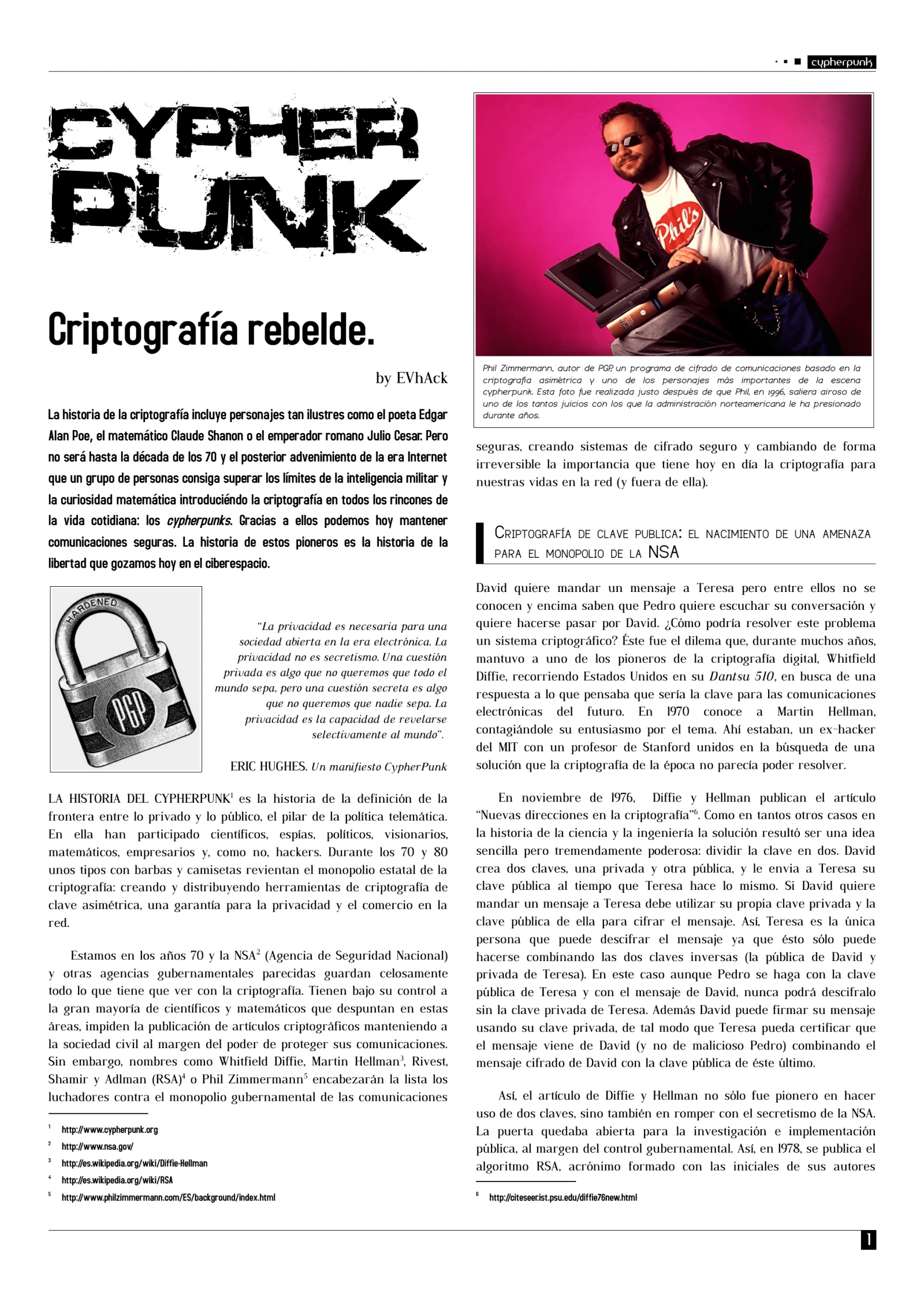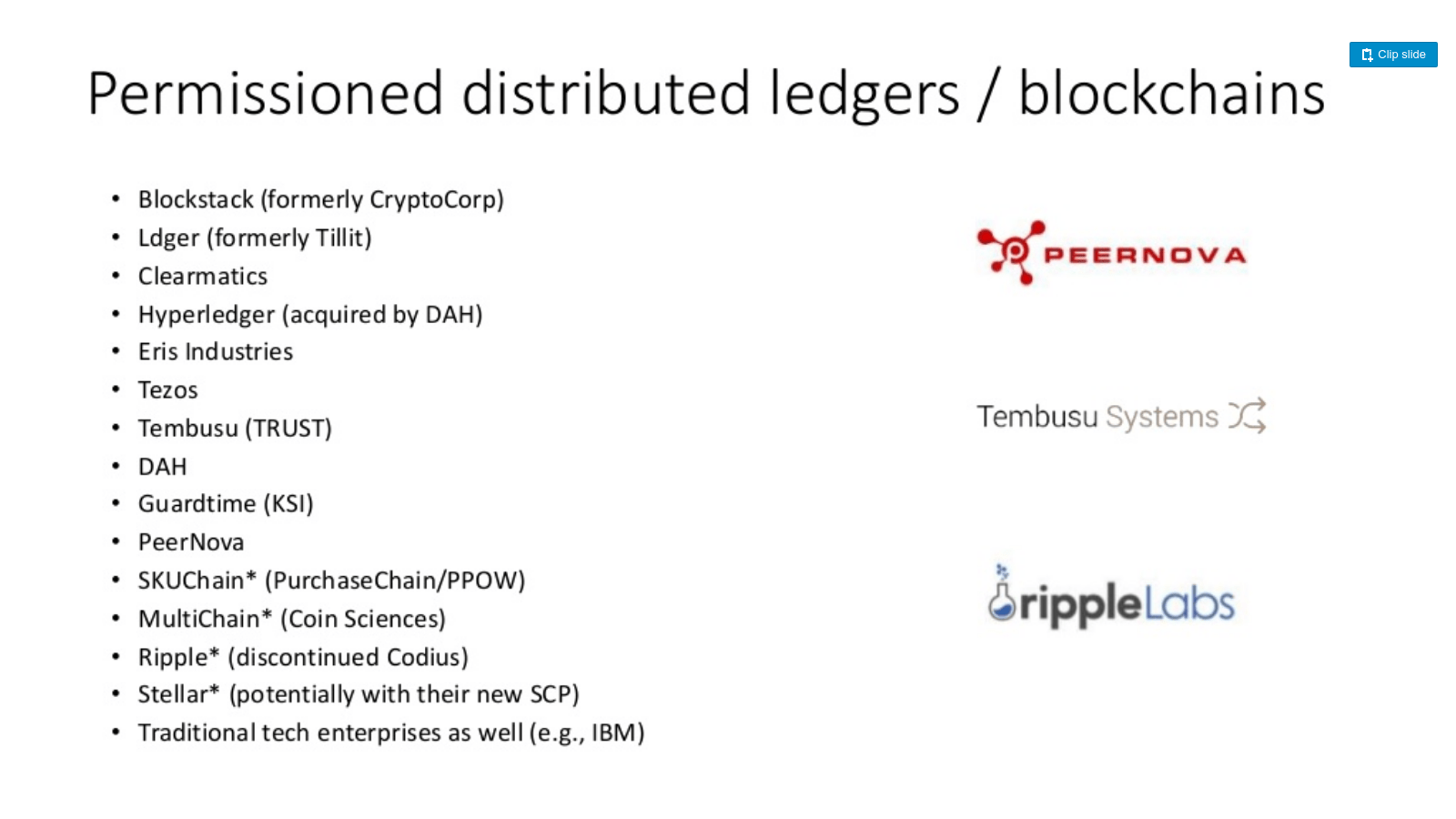Cypherpunks and the Crypto Wars
A Resource for learning about the Cypherpunk Movement.
This repository was created, in part while researching:
- Electronic Currency, Before Bitcoin

Crypto Wars
- Birth of Cypherpunks: Short
- wiki.openrightsgroup.org/wiki/Crypto_Wars
- wikipedia.org/wiki/Crypto_Wars
- Untold History of Blockchain
- Phil Zimmerman creates PGP(‘91), the first publicly available encryption allowing people to communicate using 128-bit encryption and Diffie-Hellman for key management. Zimmerman published PGP code in book form to strengthen its case as freedom ofspeech.
- Open Source software development
- Peer to peer sharing
- Crypto Wars, Phil Zimmermann and PGP
Phil Zimmermann was a key player in this period. The PGP software he authored was considered as munitions by the US government and subject to export licenses. The US government at this time was keen to avoid strong crypto falling into the hands of civilians and foreign governments. At this time the US government was also pushing for specialised key-escrowed chips that would perform encryption, but make the plaintext readable to NSA if necessary. This was rightly considered a gross violation of privacy, rights, and a huge security hole by the cypherpunks.
- Why I Wrote PGP -Part of the Original 1991 PGP User’s Guide
- Defending the last missing pixels: Phil Zimmermann speaks out on encryption, privacy, and avoiding a surveillance state
Since writing the PGP encryption software in the 1990s, Phil Zimmermann has been a key figure in the internet privacy debate. With that argument heating up again, his perspective is more relevant than ever.
- Bernstein vs US Dept of Justice (Decided in ‘96)
While a graduate student at the University of California at Berkeley, Bernstein completed the development of an encryption equation (an “algorithm”) he calls “Snuffle.” Bernstein wishes to publish a) the algorithm (b) a mathematical paper describing and explaining the algorithm and (c) the “source code” for a computer program that incorporates the algorithm. Bernstein also wishes to discuss these items at mathematical conferences, college classrooms and other open public meetings. The Arms Export Control Act and the International Traffic in Arms Regulations (the ITAR regulatory scheme) required Bernstein to submit his ideas about cryptography to the government for review, to register as an arms dealer, and to apply for and obtain from the government a license to publish his ideas. Failure to do so would result in severe civil and criminal penalties. Bernstein believes this is a violation of his First Amendment rights and has sued the government.
- Code Wars — How ‘Ultra’ and ‘Magic’ Led to Allied Victory
When the top secret code breaking activities at Bletchley Park were revealed in the 1970s, much of the history of the Second World War had to be rewritten. Code Wars examines the role of ULTRA (the intelligence derived from breaking secret enemy signals) on major events of the Second World War. It examines how it influenced the outcome of key battles such as D-Day, El Alamein, Crete, key naval battles, the controversy surrounding Churchill and Coventry, the shadowing of Hitler’s V1 pilotless aircraft and the V2 rocket.
http://en.citizendium.org/wiki/Computers,_Freedom_and_Privacy
Cypherpunk Mailinglist
* Resources roughly in historical order, either by date of publication or story told.
- Cypherpunks, Bitcoin & the Myth of Satoshi Nakamoto (‘13)
The Cypherpunks began properly in 1992 when Tim May, Eric Hughes and John Gilmore, started the Cypherpunks’ mailing list. But Jim Bell, David Chaum, Phil Zimmerman, Julian Assange, Adam Back, Wei-Dai and Hal Finney are just a few of the ciphers on the mailing list who are just now becoming luminaries, because they’ve all contributed something so uniquely valuable to us through their efforts to protect our privacy in the new information economy, particularly against the encroaching financial surveillance complex (typified by FATCA).\ Other names, like Tim-Berners Lee, John Perry Barlow and Nick Szabo also feature in this essay, as ‘Cypherpunks by proxy’ because of their contributions and their philosophy.
- The Crypto Anarchist Manifesto
- A specter is haunting the modern world, the specter of crypto anarchy.\ Computer technology is on the verge of providing the ability for individuals and groups to communicate and interact with each other in a totally anonymous manner. -Timothy C. May (‘92)
- A Cypherpunk’s Manifesto Eric Hughes (‘93)
Privacy is necessary for an open society in the electronic age. Privacy is not secrecy. A private matter is something one doesn’t want the whole world to know, but a secret matter is something one doesn’t want anybody to know. Privacy is the power to selectively reveal oneself to the world.”
- CRYPTOQUIKREAD_163 - A CYPHERPUNK’S MANIFESTO
- Wired - Crypto Rebels (‘93) - Deep Cut
- THE CYPHERNOMICON: Cypherpunks FAQ and More - 1994 - Tim May[ϟ]
-
 \ https://twitter.com/Adam_Tache/status/1060234474892361728
\ https://twitter.com/Adam_Tache/status/1060234474892361728
For more cypherpunk books check out goodreads.
-
The Crypto-Anarchists by Brian Zuzga (‘94)
- Privacy-enhancing technologies for the Internet by Ian Goldberg David Wagner Eric Brewer (‘96)
The increased use of the Internet for everyday activities is bringing new threats to personal privacy. This paper gives an overview of existing and potential privacy enhancing technologies for the Internet, as well as motivation and challenges for future work in this field
-
R.I.P. Cypherpunks (‘01)
-
Crypto Anarchy, Cyberstates, and Pirate Utopias
- Cypherpunk rising: WikiLeaks, encryption, and the coming surveillance dystopia
- EARLY CYPHERPUNK IN FACT AND FICTION. CYPHERPUNK WAS BOTH AN EXCITING NEW VISION FOR SOCIAL CHANGE AND A FUN SUBCULTURE DEDICATED TO MAKING IT HAPPEN
Flashback: Berkeley, California 1992. I pick up the ringing phone. My writing partner, St. Jude Milhon, is shouting down the line: ‘I’ve got it! Cypherpunk!’
- EARLY CYPHERPUNK IN FACT AND FICTION. CYPHERPUNK WAS BOTH AN EXCITING NEW VISION FOR SOCIAL CHANGE AND A FUN SUBCULTURE DEDICATED TO MAKING IT HAPPEN
-
No more secrets! Cypherpunks, WikiLeaks, and the new era of total surveillance
-
RU Sirius on the history of cypherpunk
-
Cypherpunks Write Code ϟ (‘15)
-
An Introduction to the Cypherpunk Tale
- Bitcoin and the rise of the Cypherpunks by Jameson Lopp (‘16)
- 1980s, Dr David Chaum
- late 1992, Eric Hughes, Timothy C May, and John Gilmore founded cypherpunks
- The Cypherpunks mailing list was formed, and a few months later, Eric Hughes published “A Cypherpunk’s Manifesto“.
“Privacy is necessary for an open society in the electronic age. Privacy is not secrecy. A private matter is something one doesn’t want the whole world to know, but a secret matter is something one doesn’t want anybody to know. Privacy is the power to selectively reveal oneself to the world.”
- Notable Cypherpunks:
- Jacob Appelbaum: Tor developer
- Julian Assange: Founder of WikiLeaks
- Dr Adam Back: Inventor of Hashcash, co-founder of Blockstream
- Bram Cohen: Creator of BitTorrent
- Hal Finney: Main author of PGP 2.0, creator of Reusable Proof of Work
- Tim Hudson: Co-author of SSLeay, the precursor to OpenSSL
- Paul Kocher: Co-author of SSL 3.0
- Moxie Marlinspike: Founder of Open Whisper Systems (developer of Signal)
- Steven Schear: Creator of the concept of the “warrant canary”
- Bruce Schneier: Well-known security author
- Zooko Wilcox-O’Hearn: DigiCash developer, Founder of Zcash
- Philip Zimmermann: Creator of PGP 1.0
- In 1997, Dr Adam Back created Hashcash
- Later in 1998, Wei Dai published a proposal for “b-money”,
-
Cypherpunk the Origin of Wikileaks
-
Untold History of Bitcoin: Enter the Cypherpunks
-
Cypherpunks and the failure of the Centralized Web
-
This Machine Kills Secrets: How WikiLeakers, Cypherpunks, and Hacktivists Aim to Free the World’s Information. by Andy Greenberg. Virgin Books, London, 2012 Book Review by Harry Halpin
- Tim May, Father of ‘Crypto Anarchy,’ Passes Away
Modern Crypto Wars
- The Crypto Wars Are Over! (‘05)
- Crypto Wars: The Tech World vs. the NSA (‘13)
- The NSA is Making Us All Less Safe
- A complete guide to the new ‘Crypto Wars’
Recommended Reading
What follows is a list of books that were influential upon early cypherpunks. As time goes on, I’ll add more modern material. Also, Cypherpunk is an offshoot of Cyberpunk, as such, there is much overlapp in the culture and cyberpunk literature should be of interest to those trying to delve into the cypherpunk mythos.
-
Crypto, by Steven Levy - Pre-History from the 50’s up to the cypherpunk era.
-
May’s Recommended readings, from cyphernomicon.
- 1984 by George Orwell ‘49
- Atlas Shrugged by Ayn Rand ‘57
- Machinery of Freedom by David Friedman ‘73
- The Shockwave Rider by John Brunner ‘75
- True Names by Vernor Vinge ‘81
- Security without Identification: Transaction Systems to Make Big Brother Obsolete ‘85
- Advances in Cryptology by Gilles Brassard ‘90
- Snow Crash, Neil Stephenson ‘92
- Applied Cryptography by Bruce Schneier ‘93
many of us have found Vernor Vinge’s “True Names” to be an excellent (and quickly readable) treatment of how things could work in a world of fast, cheap, and secure communication. Other writers have seen things differently (e.g., “Shockwave Rider,” “1984,”,”Snow Crash”). \ — Tim May Cyberspace Crypto-Anarchy and Pushing Limits
- https://nakamotoinstitute.org/literature/
Bitcoin was not forged in a vacuum. These works serve to contextualize Bitcoin into the broader story of cryptography and freedom.


- This Machine Kills Secrets: How WikiLeakers, Cypherpunks, and Hacktivists Aim to Free the World’s Information, by Andy Greenberg ‘12

-
Cyberpunk and Cyberculture: Science Fiction and the Work of William Gibson. ^^^ Really excellent literary review!
- The Essential Cyberpunk Reading List ‘15
- Neuromancer by William Gibson
- Cryptonomicon - Neil Stephenson
-
The Diamond Age - Neil Stephenson
-
https://github.com/reiver/blockchain-reading-list - this list has a bunch of the early essential blockchain reading
-
https://www.reddit.com/r/ethereum/comments/a98mam/cypherpunk_book_recommendations/
- A History of Cryptography and the Rise of the CypherPunks #Reading_list
An excellent history of public-key cryptography and the Cypherpunk Phenomena appears in The cypherpunk revolution a Christian Science Monitor project from July 2016.
The best history of digital cash is Cryptocurrency: How Bitcoin and the Blockchain Are Challenging the Global Economic Order by Michael J. Casey and Paul Vigna. Sadly that book; which appeared in 2015 is already dated, but it is still an eye opener.
There are many excellent books about cryptography and codebreaking in World War II. One of the best is Code Girls by Liza Mundy, which explores the origins of the NSA and American cryptography. Still worth reading is Ronald Lewin’s Ultra Goes to War: The Secret Story; which first publicized the role encryption played in World War II back in 1977.
Resources
- cypherpunk—research
“This repository is essentially for compiling information about Cypherpunks, the history of the movement, and the people/events of note.”
- cryptoanarchy.wiki - archive Crypto Anarchy: Encryption, digital money, anonymous networks, digital pseudonyms, zero knowledge, reputations, information markets, black markets, collapse of governments.
- Activism: Cypherpunks “Cypherpunks write code.”
- cypherpunks.to - archive a center for research and development of cypherpunk projects such as remailers, anonymous peer-to-peer services, secure network tunnels, mobile voice encryption, untraceable electronic cash, secure operating environments, etc.
- bitcoinwiki.org/wiki/Cypherpunk
- citizendium.org/wiki/Cypherpunk
- Mirror of Cypherpunkd radio series
Non-English
- #21MILLIONS - Épisode 1 - Cypherpunk : la préhistoire du Bitcoin (avec Manuel Valente)
ON GITHUB
Edit this page
Share on
Twitter Facebook LinkedIn Reddit
SUPPORT THE CAUSE
I love to **Earn Bitcoin** working with kind folk such as yourself.
More than a job, I'd love to generate an income by creating this site, and making it the most comprehensive resource to learn about Bitcoin and the technologies\economies that surround it.
| BITCOIN | DOGE |
|---|---|
| 1A1DZfw4VgpHCgnMjnmfDnMjddKf8xdYbd | DQKkzfJjqnXUD8Z7C3e84vKzvghPe9dXSa |
 |
 |



